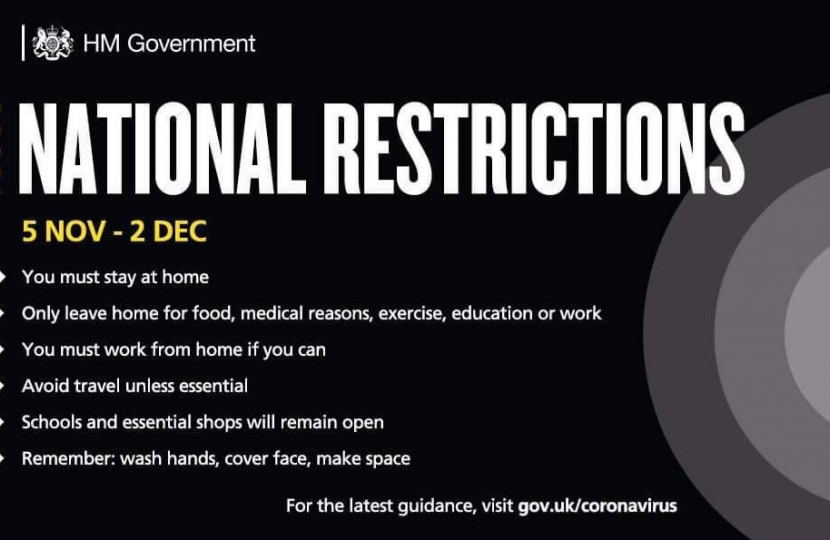
The Prime Minister Boris Johnson has given an update on Covid-19:
The overrunning of the NHS would be a medical and moral disaster beyond the raw loss of life. The huge exponential growth in the number of patients – by no means all of them elderly – would mean that doctors and nurses would be forced to choose which patients to treat, who could get oxygen and who could not; who would live and who would die; and they would be forced to choose between saving COVID-19 patients and non-COVID-19 patients. The sheer weight of COVID-19 demand would mean depriving tens of thousands - if not many non- more - COVID-19 patients of the care they need.
If we let infections grow in the way they could, then the risk is that the NHS will not be there for us. Even if the Government could double capacity overnight – and I am proud that we have 13,000 more nurses than a year ago, many more doctors – it still would not be enough, because the virus is doubling faster than we could conceivably add capacity.
On Wednesday, Parliament will debate and vote on the proposed course of action. Subject to that vote, from Thursday until the start of December, the law will set out that people must stay at home, and only leave home for specific reasons, including:
- For education;
- For work, if you cannot work from home;
- For exercise and recreation outdoors, with your household or on your own with one person from another household;
- For medical reasons, appointments and to escape injury or harm;
- To shop for food and essentials; and
- To provide care for vulnerable people.
Further to this:
- There is no exemption for staying away from home on holiday – so people cannot do so in this country or elsewhere.
- Non-essential shops, leisure and entertainment venues will all be closed – though click and collect services can continue and essential shops will remain open, so there is no need to stock up. Pubs, bars, restaurants must close except for takeaway and delivery services.
- Workplaces should stay open where people cannot work from home – for example in the construction or manufacturing sectors.
- Single adult households can still form exclusive support bubbles with one other household, and children will still be able to move between homes if their parents are separated.
- For those who are clinically vulnerable, or over the age of 60, we will be advising that they should be especially careful to follow the rules and minimise their contacts with others and, and not to go to work if they are unable to work from home. I know how tough shielding was, and we will not ask people to shield in the same way again.
My priority remains keeping people in education. Childcare, early years’ settings, schools, colleges and universities will all remain open. Our senior clinicians still advise that school is the best place for children to be. We cannot let this virus damage our children’s futures even more than it has done already. I urge parents to continue taking their children to school and I am extremely grateful to teachers across the country for their dedication in enabling schools to remain open.
I am under no illusions about how difficult this will be for businesses which have had to endure unimaginable hardship already this year. To support people and businesses at this critical time, we are going to extend the furlough system through November. These measures will be time-limited, starting next Thursday 5 November. They will end on Wednesday 2 December, when we will seek to ease restrictions on a local and regional basis according to the latest data and trends. While the festive period will be very different this year, by taking tough action now, we can allow families across the country to be together. It is vital that we will keep provision for non-COVID-19 healthcare needs going. Unless someone’s clinicians tell them otherwise they should continue to use the NHS, get their scans, turn up for their appointments and pick up their prescriptions and treatments. If at all possible, we want people to continue to access these services, now and through the winter.
I am optimistic that this will feel different and better by the spring. We have ever better medicine and therapies, and the realistic hope of a vaccine in the first quarter of next year. We now have the immediate prospect of using many millions of cheap, reliable and above all rapid turnaround tests, that you can use yourself to tell whether or not you are infectious within 10 to 15 minutes. We know from trials across the country in schools and hospitals that we can use these tests to drive down the disease. We are planning a steady but massive expansion of these quick turnaround tests applying them in all kinds of situations, from helping women to have their partners with them in labour wards, to testing whole towns and even whole cities. The army has been brought in to work on the logistics and the programme will begin in a matter of days, working with local communities, local government, public health directors and organisations of all kinds to help people discover whether or not they are infectious, and immediately to get them to self-isolate and to stop the spread.
The country will get through this – but we must act now to contain this autumn surge. We are not going back to the full-scale lockdown of March and April - it is less prohibitive and less restrictive. However, from Thursday until the 2nd of December the basic message is the same: stay at home; protect the NHS; and save lives.
